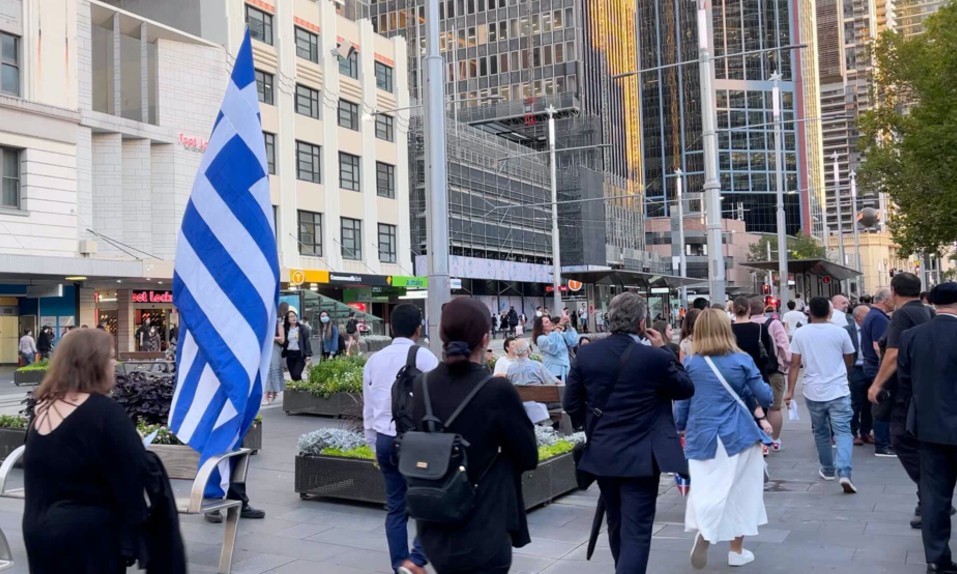By Maddy Constantine
Night fell as a talkative, well-dressed crowd settled into red, cushioned seats in Sydney’s Town Hall. The ceilings and walls were illuminated by lights in shades of blue as two large Greek flags were suspended in the foreground of the pipes of the Grand Organ.
It is March 25th, 2021, Greek Independence Day, and an orchestral performance of the Greek National Anthem, The Hymn To Liberty, is about to begin.
It is the first time the hymn, written by Dionysios Solomos in 1823, will be performed in its entirety in Australia to mark the 200 year anniversary of the Greek War of Independence against the Ottoman Empire in 1821.
It is a bittersweet occasion for the members of the Greek Diaspora as many have been physically unable to visit Greece over the past year with COVID-19 border restrictions in place.

The performance is just one of many events included in the program of the 2021 Annual Greek Festival, now in its 39th year.
“There’s been a marked difference in the interest levels from our community…We have been reaching capacity at most of our events and online engagement is significantly more active than in previous years,” says Festival Director, Pamela Proestos.
This enthusiasm, she says, can also be directly linked to the significance of the Bicentennial celebration of Greek Independence.
“2021 is a year which allows us to reflect and commemorate this important moment in our shared history. The community is enthusiastic about celebrating the Greek War of Independence and is actively seeking ways to do so,” Ms. Proestos said.
This need to validate and strengthen ties to cultural identity has materialised for the Greek Diaspora during the pandemic through music. As George Ellis, the conductor of the orchestra, waved his baton, the atmosphere in the room was sombre.

“The Hymn to Liberty is not simply a poem,” said Professor Vrasidas Karalis, Chair of the Modern Greek Department of the University of Sydney.
“This melody escorted thousands of Greeks to their deaths…thanks to poems and music like this we survive forever,” he said..
Just down the street from Town Hall at Circular Quay, the walls of the Sydney Opera House were illuminated with the Greek flag. This is the first time in Australia that Greece has been artistically commemorated on perhaps our most iconic monument.
Many Greek Australians gathered on the steps of the Opera House and along the shore to experience the historic moment with their friends and family. Many could be seen dancing traditional Greek folk dances.
“All the Greeks were there, some wrapped in flags and dressed in national costume, dancing among themselves because they couldn’t do that during COVID. It was very moving and beautiful,” said Greek Australian Fay Kotsis who was at Circular Quay that night.

The Pandemic had also taken its toll on the local arts and entertainment industry in New South Wales but Nia Karteris, Chair of the Greek Festival says it has been “encouraging to see the resilience of creators, in spite of it.”
For brothers Tass and Haris Strangas there could be no better way of re-invigorating their connection to Greece after COVID then by planning the return of their nightclub event, Olympus, at the Ivy Pool.
“People haven’t had this experience for a long time,” said Haris Strangas, Event Organiser at Olympus Entertainment.
“We want this event to capture the beauty of Greek music,” said Haris.
The Greek youth of Sydney are not the only ones who are using music to connect with their roots after the pandemic. Mary Zournazi, a Greek-Australian filmmaker and Associate Professor in the School of Social Sciences at the University of New South Wales, has spent her time during the pandemic editing her latest documentary titled “My Rembetika Blues”.
“My film is a story about home, migration and about how music is a connecting thread that brings people together. When I listen to Rebetiko music I am living the lives of my ancestors, almost like a body memory from the past,” says Mary.
As the colours of the Greek flag ribboned around the Sydney Opera House on that cloudless night in March, one sound could be heard above the commotion, the melodic strings of a bouzouki.
